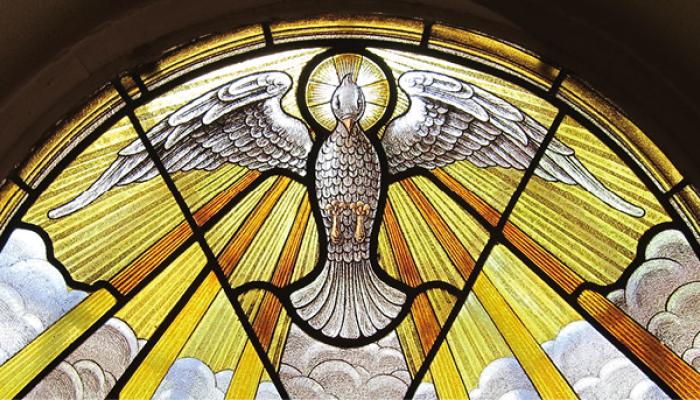
2.14 Maaari ba akong maging isang mabuting Kristiyano kung wala ang Simbahan?
Alam ni Hesus na hindi madaling mabuhay bilang isang Kristiyano. Samakatuwid, itinatag niya ang Simbahan kung saan ang lahat ng kanyang mga tagasunod ay magkasamang bumubuo ng isang pamayanan. Sa pamamagitan ng pamayanan na ito, ang tapat ay maaaring lumapit sa Diyos, lalo na sa pamamagitan ng pagtanggap ng mga sakramento [>3.35] at sa pamumuhay na itinuturo sa atin ng Diyos [>4.7].
Mahal na mahal tayo ni Hesus na handa niyang inalok ang kanyang buhay [>1.26] para sa Simbahan. Sinumang tumanggi sa Simbahan ay tumatanggi din kay Hesus. Kapag hindi alam ng mga tao ang simbahan nang walang kasalanan sa kanilang bahagi, hindi ito nangangahulugan na sila ay kusang isinumpa [>1.44]. Gayunpaman, mas madaling lumapit sa Diyos sa pamamagitan ng Simbahan, at maging masaya sa langit magpakailanman. Hinahangad ito ng Diyos para sa lahat ng mga tao!
In what way is the Church holy?
The Church is holy insofar as the Most Holy God is her author. Christ has given himself for her to sanctify her and make her a source of sanctification. The Holy Spirit gives her life with charity. In the Church one finds the fullness of the means of salvation. Holiness is the vocation of each of her members and the purpose of all her activities. The Church counts among her members the Virgin Mary and numerous Saints who are her models and intercessors. The holiness of the Church is the fountain of sanctification for her children who here on earth recognize themselves as sinners ever in need of conversion and purification. [CCCC 165]
What does it mean to say that the Church is the universal sacrament of salvation?
This means that she is the sign and instrument both of the reconciliation and communion of all of humanity with God and of the unity of the entire human race. [CCCC 152]
What is the meaning of the affirmation “Outside the Church there is no salvation”?
This means that all salvation comes from Christ, the Head, through the Church which is his body. Hence they cannot be saved who, knowing the Church as founded by Christ and necessary for salvation, would refuse to enter her or remain in her. At the same time, thanks to Christ and to his Church, those who through no fault of their own do not know the Gospel of Christ and his Church but sincerely seek God and, moved by grace, try to do his Will as it is known through the dictates of conscience can attain eternal salvation. [CCCC 171]
Who belongs to the Catholic Church?
All human beings in various ways belong to or are ordered to the Catholic unity of the people of God. Fully incorporated into the Catholic Church are those who, possessing the Spirit of Christ, are joined to the Church by the bonds of the profession of faith, the sacraments, ecclesiastical government and communion. The baptized who do not enjoy full Catholic unity are in a certain, although imperfect, communion with the Catholic Church. [CCCC 168]
What is the relationship of the Catholic Church with the Jewish people?
The Catholic Church recognizes a particular link with the Jewish people in the fact that God chose them before all others to receive his Word. To the Jewish people belong “the sonship, the glory, the covenants, the giving of the law, the worship, the promises, and the patriarchs; and of their race, according to the flesh, is the Christ”(Romans 9:4, 5). The Jewish faith, unlike other non-Christian religions, is already a response to the revelation of God in the Old Covenant. [CCCC 169]
What is the bond that exists between the Catholic Church and non-Christian religions?
There is a bond between all peoples which comes especially from the common origin and end of the entire human race. The Catholic Church recognizes that whatever is good or true in other religions comes from God and is a reflection of his truth. As such it can prepare for the acceptance of the Gospel and act as a stimulus toward the unity of humanity in the Church of Christ. [CCCC 170]
Ano ang pananaw ng Simbahan sa iba pang relihiyon?
Iginagalang ng Simbahan lahat ng kung anong mabuti at totoo sa ibang → relihiyon. Kanyang ginagalang at itinataguyod ang kalayaan sa relihiyon bilang isang karapatang pantao. Gayon pa man, alam niya na si Jesukristo ang tanging tagatubos ng lahat ng tao. Siya lamang ang "siyang daan, ang katotohanan at ang buhay" (Jn 14:6).
Ang sinumang naghahanap sa Diyos ay malapit sa ating mga Kristiyano. Isang espesyal na antas ng "relasyon" ang mayroon sa mga Muslim. Gaya ng Judaismo at Kristiyanismo, nabibilang din ang Islam sa mga monoteistikong → relihiyon (→ monoteismo). Pati ang mga Muslim ay sinasamba ang Diyos na tagapaglikha at si Abraham bilang ama ng kanilang pananampalataya. Si Jesus ay itinuturing na isang dakilang propeta sa Koran; si Maria, ang Kanyang ina, bilang ina ng propeta. Itinuturo ng Simbahan na lahat ng tao na hindi kilala si Kristo at ang Kanyang Simbahan nang hindi nila kasalanan, ngunit taimtim na naghahanap sa Diyos at sinusunod ang tinig ng kanilang konsiyensiya, ay magtatamo ng walang hanggang kaligtasan. Pero ang sinumang nakakilala na si Jesukristo ang "siyang daan, ang katotohanan at ang buhay," ngunit hindi Siya nais sundan, ay hindi makakakita ng ibang daan tungo sa kaligtasan. Ito ang ibig sabihin ng pangungusap na, "Extra ecclesiam nulla salus" (walang makikitang kaligtasan sa labas ng Simbahan). [Youcat 136]
Ano ang misyon ng Simbahan?
Ang misyon ng → Simbahan ay patubuin at palaguin sa lahat ng tao ang kaharian ng Diyos na nagsimula na kay Jesus.
Kung saan nakarating si Jesus, nahaplos ng langit ang lupa: ang kaharian ng Diyos ay nagsimula, isang kaharian ng kapayapaan at ng katarungan. Pinagsisilbihan ng → Simbahan itong parehong kaharian ng Diyos. Hindi siya naririyan para sa kanyang sarili. Dapat niyang ipagpatuloy ang sinimulan ni Jesus. Dapat siyang kumilos kung paano maaaring kumilos si Jesus. Ipinagpapatuloy niya ang mga banal na tanda ni Jesus (→ Mga Sakramento). Kanyang pinapalaganap ang mga pangaral ni Jesus. Kaya ang Simbahan, sa lahat ng kanyang mga kahinaan, ay isang malakas na bahagi ng langit sa lupa. [Youcat 123]
Sinumang nahihiwalay sa Simbahan ... ay nahiwalay mula sa mga pangako ng Simbahan ... Siya ay isang estranghero: hindi siya maaaring magkaroon ng Diyos bilang isang ama na walang Simbahan bilang isang ina. [St. Cyprian, On the Unity of the Catholic Church, Chap. 6 (ML 4, 502)]





